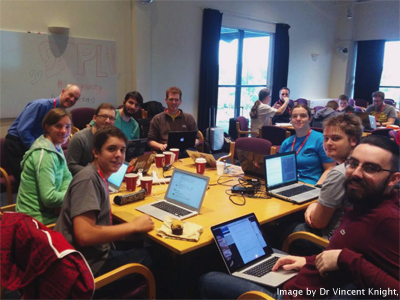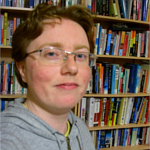Event for Research Software Engineers starts and ends with a bang at PyCon UK
Posted on 30 September 2015
Event for Research Software Engineers starts and ends with a bang at PyCon UK
 By Sarah Mount, Research Associate King’s College London and Institute Fellow.
By Sarah Mount, Research Associate King’s College London and Institute Fellow.
The first ever PyCon UK track for Research Software Engineers ended with a bang, when the conference venue was evacuated following the discovery of a one ton World War II bomb at a local building site! However, there was plenty of explosive material at the event, even before the bomb squad arrived.
You might be wondering, why another track for researchers in a Python conference? The answer isn’t simply that Python is popular in science and data analysis. PyCon UK is a community conference, it has no formal publication associated with it and most delegates come from industry, rather than academia. As such, the focus of the event is on writing high quality, robust, usable software. Research Software Engineers (RSEs) are often woefully under-supported in this area, and the problems posed by writing robust software are often deferred under pressure to produce the next paper or grant application. The Software Carpentry initiative aims to give RSEs a strong and broad grounding in computing skills. With the new PyCon UK track, we wanted to build a supportive community, where RSEs could continue learning beyond the classroom. Because PyCon UK is a community conference, we are in a strong position to provide a sympathetic environment where researchers could meet with professional software engineers to share skills and experiences.
The track attracted a fascinating and diverse array of talks and practical sessions. Simon Sheridan started the track with a Keynote talk on his experiences developing the Ptolemy instrument for the Rosetta space mission. Two workshops touched on hot topics in practical software development - accelerating high-performance code and testing. Talks from the community covered topics from using Python to visualise results in game theory (complete with a live demonstration of the Prisoner’s Dilemma) to humanitarian work following earthquakes and automating literature searchers with natural language processing. 2015 Software Sustainability Institute Fellow Alys Brett demonstrated the use of microservices to access results from JET, the world’s foremost nuclear fusion experiment. We also had a lively panel debate on publications, covering everything from software to improve the efficiency of submission processes, to open access and future models of payment.
The long weekend ended with sprints. These were cut short by the evacuation of the conference venue, but not before progress had been made on refactoring, documenting and testing research software brought along by the delegates. A fluid dynamics library built on the SciPy stack added its unit tests to the continuous integration tool Travis-CI, this means that every time the developers push their changes to GitHub or look at a pull request, they will be able to see from within GitHub whether the changes are working correctly. This workflow helps to prevent bugs being introduced to the master branch, where they might cause problems for users. The Axelrod tournament team (featured in the photograph above) were working on a Python implementation of a 1981 paper by Robert Axelrod. They added some more strategies to the tournament, addressed some bugs and improved their documentation. Most importantly, they have had contributions to the software after the conference finished.
PyCon UK is a conference which aims to foster a diverse and welcoming community. Approximately 30% of the Science Track speakers were female. We had talks from delegates in both industry and academia and at all career stages, including a talk from an undergraduate. To ensure that the event is clearly open to researchers in the digital humanities and arts, the track will be renamed next year to Code4Research. Between now and then, the 2015 participants have started a Slack team to continue the conversation that began at the conference.
Plans are already underway for the 2016 event, we can’t wait to see what the research community comes up with in twelve months time.
Media links
- More info on the PyCon UK site.
- Video of Simon Sheridan Keynote on the Ptolemy instrument.
- Twitter links:
- https://twitter.com/opcampbell/status/645987824207007744
- https://twitter.com/drvinceknight/status/645899236459085825
- https://twitter.com/drvinceknight/status/645557449047605248
- https://twitter.com/drvinceknight/status/645554750994403328
- https://twitter.com/drvinceknight/status/645550539221135360
- https://twitter.com/drvinceknight/status/645532764176019456
- https://twitter.com/drvinceknight/status/645162123807621120

